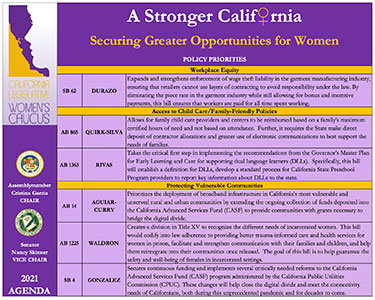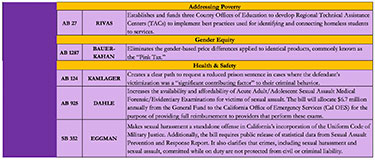

Budget 2021-2022
The Legislative Women’s Caucus is requesting a $2 billion investment for child care to expand the number of children served by 200,000, implement child care reimbursement rate reform, waive family fees for all families, and modernize the administration of child care programs.
Additionally, the Caucus is requesting a one-time appropriation of $310 million, over three years, for targeted job training for women.
Workplace Equity
SB 62 (Durazo)
Expands and strengthens enforcement of wage theft liability in the garment manufacturing industry, ensuring that retailers cannot use layers of contracting to avoid responsibility under the law. By eliminating the piece rate in the garment industry while still allowing for bonus and incentive payments, this bill ensures that workers are paid for all time spent working.
Access to Child Care/Family-Friendly Policies
AB 865 (Quirk-Silva)
Allows for family child care providers and centers to be reimbursed based on a family’s maximum certified hours of need and not based on attendance. Further, it requires the State make direct deposit of contractor allocations and greater use of electronic communications to best support the needs of families.
AB 1363 (Rivas)
Takes the critical first step in implementing the recommendations from the Governor’s Master Plan for Early Learning and Care for supporting dual language learners (DLLs). Specifically, this bill will establish a definition for DLLs, develop a standard process for California State Preschool Program providers to report key information about DLLs to the state.
Protecting Vulnerable Communities
AB 14 (Aguiar-Curry)
Prioritizes the deployment of broadband infrastructure in California’s most vulnerable and unserved rural and urban communities by extending the ongoing collection of funds deposited into the California Advanced Services Fund (CASF) to provide communities with grants necessary to bridge the digital divide.
AB 1225 (Waldron)
Creates a division in Title XV to recognize the different needs of incarcerated women. This bill would codify into law adherence to providing better trauma-informed care and health services for women in prison, facilitate and strengthen communication with their families and children, and help them reintegrate into their communities once released. The goal of this bill is to help guarantee the safety and well-being of females in incarcerated settings.
SB 4 (Gonzalez)
Secures continuous funding and implements several critically needed reforms to the California Advanced Services Fund (CASF) program administered by the California Public Utilities Commission (CPUC). These changes will help close the digital divide and meet the connectivity needs of Californians, both during this unprecedented pandemic and for decades to come.
Addressing Poverty
AB 27 (Rivas)
Establishes and funds three County Offices of Education to develop Regional Technical Assistance Centers (TACs) to implement best practices used for identifying and connecting homeless students to services.
Gender Equity
AB 1287 (Bauer-Kahan)
Eliminates the gender-based price differences applied to identical products, commonly known as the “Pink Tax.”
Health & Safety
AB 124 (Kamlager)
Creates a clear path to request a reduced prison sentence in cases where the defendant’s victimization was a “significant contributing factor” to their criminal behavior.
AB 925 (Dahle)
Increases the availability and affordability of Acute Adult/Adolescent Sexual Assault Medical Forensic/Evidentiary Examinations for victims of sexual assault. The bill will allocate $6.7 million annually from the General Fund to the California Office of Emergency Services (Cal OES) for the purpose of providing full reimbursement to providers that perform these exams.
SB 352 (Eggman)
Makes sexual harassment a standalone offense in California’s incorporation of the Uniform Code of Military Justice. Additionally, the bill requires public release of statistical data from Sexual Assault Prevention and Response Report. It also clarifies that crimes, including sexual harassment and sexual assault, committed while on duty are not protected from civil or criminal liability.